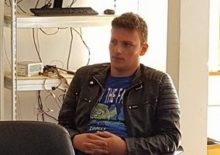 Stacy Bradford is the Executive Director of SixDegrees, a charity organization led by actor and musician Kevin Bacon which allows people to become celebrities of their own causes by donating or raising money for charities in the United States.
Stacy Bradford is the Executive Director of SixDegrees, a charity organization led by actor and musician Kevin Bacon which allows people to become celebrities of their own causes by donating or raising money for charities in the United States.
Stacy recently visited us to work with our webdesign and development teams on a new web-based application called 6Tag. The app is designed to raise funds or any support for non-profit organizations, giving users the opportunity to challenge their friends to create 20-second videos in order to achieve that goal.
I have talked to Stacy and we have touched a variety of topics, from her childhood and career path to SixDegrees, to the differences between the US and Romanian IT companies, bringing into discussion even the unexplored beauties of Romania and the ‘recipe of success’ regarding a startup. It turned out to be a very interesting interview. You can read it below.
Tell me a little bit about you. Who is Stacy Bradford, where did she grow up?
I grew up in Southern California, I was born in Pittsburgh which is on the East Coast of the United States, like a small industrial town. But my parents didn’t feel like there were a lot of opportunities. They were both nurses and we moved to Southern California to have a better life. My dad has always wanted to be by the beach and sunshine and all that. I went to all of my school through university in a town called Redlands.
After I graduated I started doing sales and business development and really enjoyed that for a long time. I moved to Washington DC, about five years ago, and I started getting involved in non-profits from a volunteer perspective. I just started working with kids, it’s an organization that I am also on the board of. The company is called Learning Plunge, it’s a 501(c)(3) and it helps teach kids critical thinking, strategy, and sportsmanship in elementary and middle school. Getting involved in that organization and several business associations grew my passion for giving back and it allowed me to develop a lot of my skills that I didn’t think I had. Being a volunteer, sitting on a board and advise, planning events and seeing the community grow and benefit from those things really became a passion of mine.
About two years ago, this opportunity opened up, for SixDegrees. Kevin was looking to make some changes in the organization. I was really excited. A friend of mine actually knew the past Executive Director, who was looking to transition. He interviewed me and then I met Kevin, we all got along really well, and they offered me the job.
What are your responsibilities at SixDegrees?
I am the Executive Director. I do all kinds of things but the big picture is that I’m strategizing on how to help small non-profits raise their profile. There are so many wonderful non-profits and so many wonderful large non-profits that get a lot of support, they get a lot of celebrity endorsements and many people know who they are. But there’s a lot of these great grass roots non-profits and local NGOs that are doing the fieldwork, they are kind of ground zero and that they are often overlooked. So our idea was that we would do anything we could to help raise support, whether that be money, awareness, help them with more donor outreach through the types of events that we do.
For a long time, we were just doing surprise events. For example, there was a non-profit that was an urban garden that would teach the community around it about nutrition and agriculture and all that fun stuff. Kevin would pop up, roll-up his sleeves and garden with the local volunteers. And it was very fun and exciting and it served two purposes. The first purpose was that you get to help these non-profits with a little bit of buzz and press and it’s exciting for the people that benefit from the non-profit and for the people that work for it, to thank them for their work. The second part is that the celebrity or influencer that shares their time really gets to do something that they don’t typically get to do. They don’t get to really be out in the real world, with every day people, and trying to solve some problems. And by no means do we think that we are solving the problems of the world but what we’re trying to do is show how easy it is to take a little bit of your time and use your platform for good. And if more people did that, we think that a lot of these non-profits would have more support from the local level.
What are we working on together here? What are we developing?
It’s exciting! We are creating a platform called 6Tag, think ‘Snapchat for giving’. The idea is we are going to create a web-based platform primarily and eventually it will become an app, where you are able to create a fun challenge. If you remember the Ice Bucket Challenge, that was really popular. That campaign raised over 40 million dollars and it continues to raise money because they do replicate it each year to a much smaller degree.
And we thought what if we could take the components that made that really successful and help create something that gave scaffolding and support for someone that loves this some non-profit, they may work for it, they may volunteer there, or they just think they’re doing great work. They can use 6Tag to create a fun challenge for their friends that has incentives and goals along the way. You’ll have 20 seconds to make a quick video, to take the challenge, and we help. The goal is to get 6 levels away from that original catalyst. I invite 6 friends and those 6 people invite 6 friends, and so forth until we get at least 6 levels away from that original catalyst. With the idea that we are all 6 degrees or less from someone or something that really needs our help.
REEA has been a fantastic partner. We are only in our first few weeks but we’ve gone through four months of an RFP (Request for Proposal) process with them. They really set the bar. They were so thorough and understanding of our culture, what we are trying to achieve. They knew that I didn’t have a technologist background and I’m not very technical at all. I was able to really understand why they were proposing the things they were proposing and why those things would be better than other options, and so it was very clear and very thorough. REEA is helping with the design of the web-based app, and then with all of the coding and backend support.
How did you get in contact with REEA?
It was through one of our advisers, who had done a project years back and had met Dan Mașca, your CEO, and had a really successful interaction and project with you guys. When I was building up the RFP he reached out and said would you ever consider outsourcing? At that time I hadn’t even thought of it, we were only doing word of mouth introductions. I said if you think that they’re a great company, absolutely, send the names over. He introduced us to both a Romanian company and an Indian company that were part of the RFP process. He said that the best thing to do if you hire them is to go and be there and meet them.
Everyone was so welcoming and excited about us coming here and meeting with all of you and I’m so glad I did because I feel like we built a warmer relationship and we started understanding each other better. Even in the first two days of going over our project we were able to clear up so many misunderstandings of what we are trying to build. I would suggest anyone who works with you or a company like yours that they just take the time, that they budget for that, to come here.
I suppose you have worked with other companies in the US. What is the difference between the American and Romanian IT companies? How does their work-flow differ from ours?
That’s a really good question. I have done several RFPs in my career but just looking at this current one, because it’s the most top of mine. We had 10 American companies, one Indian company, and then this Romanian company. I wouldn’t be able to tell you if it was a cultural thing or a nationality thing but REEA was very thorough and I think that they understood that they had to ask a lot of questions to make sure we were on the same page. They were highly aware of the language barriers and the confusion that could result from not being explicitly clear.
It was really easy to work with a lot of the American companies and ask them questions because we could just pick up a phone very easily and we were on the same time zone. What I learned from REEA was that they understood that they had to really ask every single thing they could possibly think of and had to try to really foresee the future complications or questions. Whereas a lot of the local providers didn’t do that. I think that there was – I don’t want this to come out the wrong way but – there was a hunger for REEA to work with us. There was an excitement for them to work with us and I felt that through all of our interactions. Some of the other companies had that as well but to a lesser extent. It really was apparent through all of your work.
What is lacking in the IT industry in Romania now?
What I’ve seen and heard is that it’s not that you’re missing anything from the IT industry, in fact, you are very capable. And the internet is something that keeps us all connected. So it doesn’t matter where you are in the world, you can learn those skills and you can build networks and communicate with each other. I think that you’re good there.
I feel there are a lot of things that could be done to show other people just how amazing it is here. The fact that this isn’t a tourist destination is surprising to me because you have the castles, the citadels, a long history, amazing food, you have a lot of green space, a lot of hiking and nature, animals, everything. But you can also tell that some of the people aren’t ready for tourism either.
I’ve never been to a country that experienced communism. You still have a generation that was raised in it and then another generation that was partially raised in it. Now you have this new generation that doesn’t really know what it was like before. They only hear the stories. I think with that comes more energy and a sense of freedom. I can see that REEA and other companies built right here are gonna probably forge that path forward.
Is there a recipe for success regarding a start-up or an NGO?
It sounds so trivial to say it like this but it’s hard work. If anybody thinks that owning their own company whether it’s a non-profit or social enterprise or a for-profit, that it’s not going to be extremely difficult they’re kidding themselves. The more realistic you can go into a situation like that, the better. The things that I think make people more successful in startups are leveraging your connections – I’ve said this a couple of times now.
We’re coming out of version 2 of SixDegrees and coming into version 3, which is a whole new model for us and so we have to raise funding, we have to look at the resources we have and apply them consciously. But we also have a lot of people that we know, maybe people we don’t know, but we know somebody that knows them. That’s the whole idea of SixDegrees. You can’t be afraid to ask for help and leverage those connections. I think that people are more altruistic than people care to believe. If you ask for help, people wanna help if they can, if they believe in your mission.
You need to have a clear mission and a clear vision. So many times you see non-profits, any business really, with unclear vision. They want to be everything to anybody or they want to put their hands in too many pots instead of doing something really-really well and then expanding on that.
I think that what can’t you replicate is the company culture. And I think that that’s where you need to make sure that you take care of your people. That’s a problem in a lot of places. They look at people as disposable, there’s lots of turnover. If you see that in a business, that’s a clear sign that something’s wrong.
You need to make sure that you are simplifying your vision and making it crystal clear. If you can’t do a 50-second elevator pitch on your company and your vision without people saying so you do this, this, and this, then that’s a problem. Go back to the drawing board over and over again until you can tighten that up.





